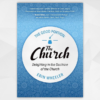Four Ways God Used a Church Fire for Good
On November 1, 2022, our church building burned down. Not one part was salvageable. The fire swept through the attic at astonishing speed. Not a single notepad or paper clip remained.
In that exact moment, years of teaching that people make a church, not the building, became real. Our motto became: “The building is lost, but the church is intact.”
Still, a sense of grief lingered. We didn’t just lose physical materials, but the memories and meanings they represented. We worshiped God in this building. We baptized new believers there. We celebrated new babies, new marriages, and heavenly homecomings. Yes, the building was not the church, but it was where the church gathered. And that means something.
At the same time, we have learned invaluable lessons about church life in the aftermath. Here are a few ways God worked the loss of our building for our good.
1. Reminded of the Essentials
Before nightfall on the day of the fire, we were able to make plans to gather in a building owned by the local Baptist Collegiate Ministry. Instantly, this transition became a powerful example, not only of believers working together, but also of the simple yet profound glory of a church continuing on.
Our first Sunday after the fire was a joyous occasion. It was a picture of God sustaining us. Our suddenly stripped-down calendar pointed us back to the most basic element of a church—gathering together as God’s people.
With everything stripped away from us, we focused on pursuing faithfulness. We preached the gospel, studied God’s Word, prayed, sang God’s praise, and cared for one another. There has been nothing fancy, flashy, or marketable about our ministry. Yet, faithfulness to the basic elements of a church has caused a flourishing beyond imagination.
It was healthy for us to be thrust off of our hamster wheel of activity and forced to rely on those few and glorious prescriptions of church life. As a result, our faith in God’s plan has grown.
2. Refreshed in the Ordinances
Routine can become numbing. Do the same thing enough times and you can do it without thinking. Sometimes we treat the ordinances this way. But what if you no longer have a baptistry or a Lord’s Supper table?
Our first Sunday after the fire, we were scheduled to take the Lord’s Supper. So we did. We passed the bread out on plates from the local thrift store. We passed the drink out in small coffee cups. In doing so, we affirmed our corporate faith in Christ on our first Sunday without a building.
The silver serving platters were gone. The table we used wouldn’t have sufficed for a dinner table. Yet the glorious practice of simplicity helped us see the power of the ordinance itself. We learned that we can still honor God even if we have nothing.
Baptism equally has taken on a fresh shine. We have several baptisms planned for the coming weeks. They will likely be conducted in the parking lot in whatever tank can hold enough water. There will be no glamour or pomp. No warm water or painted murals. There will only be cold water and happy people. That is enough. I suspect it will be a powerful picture of new life in God!
3. New Believers
As a result of our situation, people took notice of our church and began attending. One young man was converted after a few weeks. He began to bring his family with him, and now they don’t miss a Sunday.
Another person has been attending our church for several years. He has been wrestling with his faith. The Lord has been working on him in this season and he has now resolved to follow Christ and make his faith known through baptism.
God has been at work in the hearts of many others as well. If it took a building fire for such things to happen, then so be it!
4. Relating to Other Churches
Churches all around the world meet in a variety of places—homes, theatres, schools, basements, and gyms. In every case, no matter the location, redeemed saints are coming together to worship the risen Christ. By God’s grace, we have learned this lesson afresh.
We are currently living as many other churches live. We occupy a temporary space. Now we have a better idea of so many churches’ regular experience.
This has helped us pray for them, care for them, and give financially to them. We have been reminded there is much we could learn from these churches around the world.
Conclusion
Our situation has been thrust upon us without foresight. Thankfully, we’ve seen a glorious picture of how a church without a building can still uphold the glory of Christ. We don’t wish it on any church, but we wouldn’t trade it for anything else. It has been a worthy sacrifice and a wonderful blessing.








